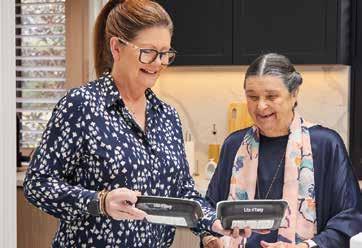
5 minute read
NEWS&VIEWS
On Your Side
Debra Nicholl, CEO of Elder Rights Advocacy, explains the essential work the group does.
Advertisement
At Elder Rights Advocacy, we recognise and acknowledge the challenges and complexity of caring for an older person either at home or in an aged-care facility. Our professional, highly skilled advocates can provide up-to-date, relevant information to help carers make informed decisions relating to care and services for the older person.

From step one in contacting My Aged Care to assessment, choosing a provider, care planning and ongoing
AN “EASY” OFFER
Meal delivery service
Lite n’ Easy believes the secret to ageing well is to eat well. Its tasty, nutritious and affordable meals are designed to promote healthy eating, wellbeing and a better quality of life for older Australians. The service is designed to make life easier too, with no shopping, cooking or cleaning required.
As a special offer for the Autumn issue of ACG, Lite n’ Easy is giving new customers 30% off* their first delivery negotiations with providers, we are here to stand beside you and ensure that your rights and the rights of the older person are respected.
At Elder Rights Advocacy, we hear from carers and family members who are in conflict over the care of the older person, and who are stressed and overwhelmed by their situation. Our advocates are here to stand beside you and work at your direction always with the older person and their perceived interests guiding the way.
The aged-care journey need not be an onerous one when you have the right support in place. Elder Rights Advocacy is a free, confidential – and, when they order online at liteneasy.com.au using the promotional code ACG30%.
If you are a Home Care Package recipient and new to Lite n’ Easy, call them on 13 15 12 and mention this offer to get the normal importantly – independent service that exists to give voice to the older person and their representative.
We are here to uphold your rights and to remind providers of their responsibility to deliver person-centered and culturally appropriate care that meets the assessed needs and preferences of the older person. Good communication and consultation are key when it comes to successfully engaging with aged-care providers, so please do not hesitate to contact Elder Rights Advocacy if you need any assistance, at era.asn.au or 1800 700 600.
30% co-payment credited on your first delivery.
*Valid for new customers’ first delivery only. Cannot be used with any other offer.
Breaking The Silence
It’s not something that gets talked about very much, but incontinence is something carers of those with dementia deal with every day. Are there any resources out there that could help?
The National Ageing Research Institute (NARI) offers this advice… Incontinence is a highly distressing and stigmatising condition that affects many people living with dementia. Up to 38 per cent of people with a diagnosis of dementia experience incontinence of urine and up to 27 per cent experience faecal incontinence. The highly personal and sensitive nature of incontinence makes the task of caring for anyone with incontinence challenging, particularly if the person with dementia does not understand or appreciate the nature of the care.
With the input of people living with dementia, carers and health professionals, NARI has developed a free online course called Caregiving, Dementia and Incontinence. It aims to provide family and professional carers with the knowledge, skills and resources to cope with all aspects of managing incontinence. The five-week course covers topics such as the basics of bowel and bladder function, and using continence aids and incontinence products and protecting the skin. The course will run throughout 2023 and users can opt in at any time. Learn more here: nari.net. au/Event/caregiving-dementia-incontinence-open-online-course.
Antioxidant Power
You read a lot about how important antioxidants are. What are some of the best antioxidant-rich foods I should be trying to incorporate into my elderly parents’ diet?
When oxygen is metabolised in our bodies, it creates unstable molecules called “free radicals”. We can cope with some of these and, in fact, the body needs them to function. But over time, too many free radicals can lead to a whole host of health problems, from increased risk of coronary heart disease, acceleration of ageing, deterioration of the lens in our eyes, arthritis, and damage to nerve cells in the brain, which can contribute to diseases such as Alzheimer’s.
And that’s where antioxidants come in: they may prevent some of the damage caused by free radicals by neutralising them. They come in two varieties: nutrient antioxidants (vitamins A, C and E, and copper, zinc and selenium); and non-nutrient antioxidants, which are the phytochemicals found in plants.
So, it makes absolute sense to incorporate them in your parents’ diet. Better Health Victoria suggests these sources: allium sulphur compounds – leeks, onions and garlic anthocyanins – eggplant, grapes and berries beta-carotene – pumpkin, mangoes, apricots, carrots, spinach and parsley catechins – red wine and tea copper – seafood, lean meat, milk and nuts cryptoxanthins – red capsicum, pumpkin and mangoes flavonoids – tea, green tea, citrus fruits, red wine, onion, apples indoles – cruciferous vegetables such as broccoli, cabbage and cauliflower isoflavonoids – soybeans, tofu, lentils, peas and milk lignans – sesame seeds, bran, whole grains and vegetables lutein – green, leafy vegetables like spinach, and corn lycopene – tomatoes, apricots, pink grapefruit and watermelon manganese – seafood, lean meat, milk and nuts polyphenols – herbs selenium – seafood, offal, lean meat and whole grains vitamin A – liver, sweet potatoes, carrots, milk and egg yolks vitamin C – oranges, blackcurrants, kiwifruit, mangoes, broccoli, spinach, capsicum and strawberries vitamin E – vegetable oils (such as wheatgerm oil), avocados, nuts, seeds and whole grains zinc – seafood, lean meat, milk and nuts zoochemicals – red meat, offal and fish. Also derived from the plants that animals eat.
Before The Fall
Where can I go to get advice about preventing falls?
If you’re a carer for an older loved one, no doubt you will be concerned about falls.
Falls are Australia’s number-one cause of injury hospitalisation and death, and are much more common in older people. In 2020-21, 243,000 people were hospitalised after a fall. Fortunately, there is help available. Active Ageing Australia – a not-for-profit group working to improve the physical health of older people – offers an online learning module, which will help you to understand more about falls and how to prevent them.
The module covers: why falls matter and the impact of a fall on a person; the risk factors which contribute to falls; how to screen for falls risk; the intrinsic (personal) and extrinsic (environmental) factors which can cause falls and how to manage these; as well as how to deal with a fall.
Each module takes about 20 minutes to complete and there are five modules. They feature interactive activities and quizzes to help with your understanding and learning, and you don’t have to complete it all in one sitting.
Cost is $14.95. More details here: learn. activeageing. org.au/modules/ introduction-tofalls-prevention.
Ingredients
• 1 large eggplant
• 10g sea salt flakes
• 50ml extra virgin olive oil
• 2 small onions, finely chopped
• sea salt flakes, extra, and freshly ground pepper
• 1tsp finely chopped garlic
• 1 x 10cm-long rosemary stem, leaves stripped and finely chopped
• 20ml apple cider vinegar
• 550g overripe tomatoes, roughly chopped into 1cm pieces
• ½ cup cooked brown lentils
• 2 tbsp tomato sauce
• 1 tbsp fresh basil, chopped
• 60ml olive oil
• 100g bocconcini, torn into pieces
• 60g parmesan (freshly grated, if possible)
• fresh basil or flat-leaf parsley, chopped, to serve





